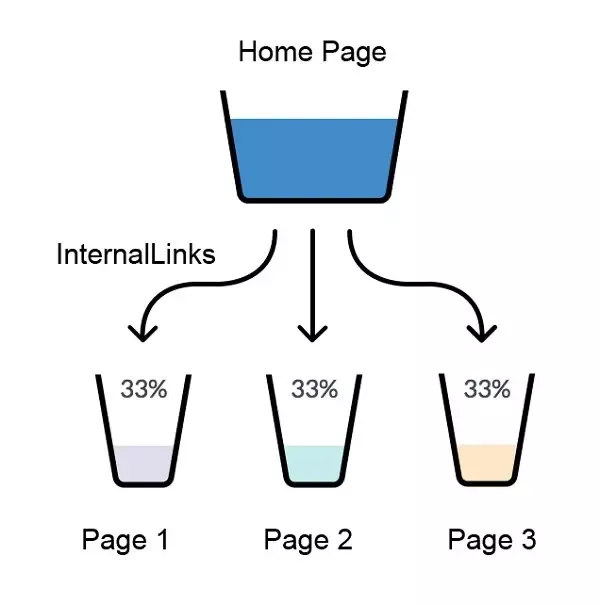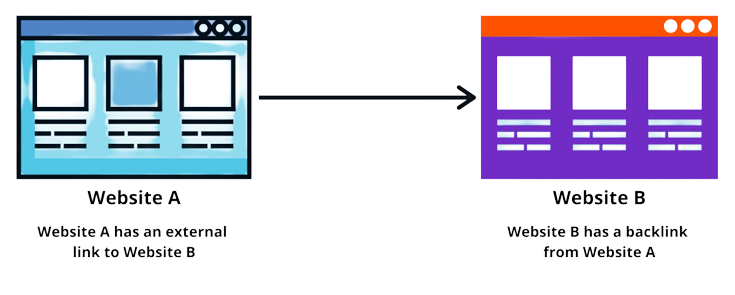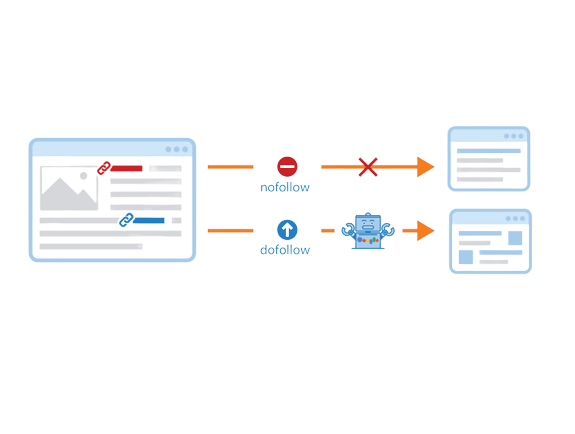
Link juice is a term used in the field of search engine optimization (SEO) to describe the value or authority passed from one web page to another through hyperlinks.
In other words, when one webpage links to another, link juice can potentially pass along some of its own credibility, relevance, and authority to the linked page. This concept is central to the idea of how backlinks (incoming links from other websites) influence a webpage’s search engine ranking.
Search engines like Google consider the number and quality of backlinks pointing to a webpage as a signal of its authority and importance.
The more high-quality and relevant websites that link to a particular page, the more likely it is to be seen as authoritative by search engines. As a result, the linked page may have a better chance of ranking higher in search engine results pages (SERPs).
Here’s a quick overview of everything we’re going to cover:
- Types of Links
- How does Link Juice work?
- Factors that affect Link Juice
- How is Link Juice determined ?
Types of Links
- Backlinks :

Backlinks, also known as inbound links or incoming links, are hyperlinks on one website that point to a webpage on another website.
In simpler terms, a backlink is a link from one website to another. These links are important in the world of search engine optimization (SEO) because they can influence a website’s search engine rankings and authority.
2. Internal Links :

Internal links are hyperlinks that connect one page of a website to another page within the same domain.
In other words, these links point from one page on a website to another page on the same website. Internal links are an essential part of website navigation, user experience, and search engine optimization (SEO).
3. External Links :

External links, also known as outbound links, are hyperlinks on a webpage that point to a different domain or website. These links lead users away from the current webpage and direct them to content on another website.
External links play a significant role in providing additional information, references, and resources to users, and they also have implications for search engine optimization (SEO).
4. Dofollow Links :
“Dofollow” links are hyperlinks that allow search engine bots to follow them and pass on authority from the source page to the linked page.
In other words, when a website includes a dofollow link to another website, it’s essentially endorsing or vouching for that website’s content in the eyes of search engines. Dofollow links are the default type of links and are used regularly on the internet.

5. Nofollow Links :
“Nofollow” links are hyperlinks that include a specific HTML attribute that tells search engines not to follow the link and not to pass on any authority or “link juice” from the source page to the linked page.
In other words, nofollow links are designed to indicate that the website owner does not necessarily endorse or vouch for the linked content in terms of search engine rankings.
How does Link Juice work?
Link juice is like a flow of importance and credibility that websites share with each other. This reputation can help websites become more popular on search engines like Google.
“Link juice” is a term used in the field of search engine optimization (SEO) to describe the authority or value that is passed from one web page to another through hyperlinks. It’s concept is based on the idea that not all links are equal in terms of their influence on a webpage’s search engine rankings and authority.
Here’s how it works –
- Linking Domain Authority – The authority of a webpage that links to another webpage affects the amount of link juice passed. If a highly authoritative and reputable website links to your webpage, it can pass a significant amount of link juice.
- Link Placement – The placement of the link on the source page matters. Links that are prominently placed within the main content of a page are often considered more valuable for passing link juice than links in sidebars, footers, or navigation menus.
- Link Relevance – The relevance of the content on the source page to the content on the linked page also matters. Links from relevant sources are considered more valuable in terms of passing link juice. For example, if you have a blog post about cooking, a link from a food-related website is more valuable than a link from an unrelated source.
- Anchor Text – The anchor text (the clickable text of the hyperlink) provides context about the linked page’s content. Descriptive and relevant anchor text can help search engines understand the topic of the linked page and can impact how link juice is distributed.
- Number of Outbound Links – The number of outbound links (links on the source page) can impact how link juice is distributed. If a source page contains many outbound links, the link juice passed to each link may be divided among them, potentially reducing the impact on each linked page.
- Internal vs. External Links – Both internal links (links within the same website) and external links (links to other websites) can pass link juice. Internal links can distribute link juice among different pages within the same domain, while external links can influence a webpage’s authority and rankings.
- NoFollow and DoFollow Links – Links can be categorized as “nofollow” or “dofollow.” Nofollow links include an HTML attribute that instructs search engines not to follow the link and not to pass on link juice. Dofollow links, on the other hand, allow link juice to flow from the source page to the linked page.
Factors that affect Link Juice
The concept of link juice is closely tied to how search engines like Google rank and evaluate websites. Several factors can affect the amount of link juice a webpage passes or receives:
- Relevance – The relevance of the content between the linking page and the linked-to page is important. If the content is closely related and contextually relevant, the link juice passed can have a stronger impact. Irrelevant or unrelated links might not pass as much value.
- Number of Outbound Links – The number of links present on a page can affect the distribution of link juice. If a page has many outbound links, the link juice passed through each link might be diluted. Pages with fewer outbound links might pass more value.
- Source Authority – The authority and credibility of the linking page play a significant role in determining the value of link juice. Links from highly authoritative and reputable websites are more valuable in passing link juice compared to links from low-quality or spammy websites.
- Position on the Page – Links placed higher up on a page are often considered more important than links buried deep within the content. Search engines might give more weight to links that appear early in the content or in prominent positions.
- Link Placement – Context matters. Links placed within the main content of a page are generally given more weight than links placed in footers, sidebars, or comments sections.
- Nofollow vs. Dofollow – Links can be categorized as “nofollow” or “dofollow.” Nofollow links include an attribute that tells search engines not to pass authority from the linking page to the linked page. Dofollow links, on the other hand, do pass authority.
- Followed Internal Links – Internal links within your own website also pass link juice. Well-structured internal linking can help distribute authority across your site’s pages and improve the overall SEO of your website.
- Linking Domain Diversity – Getting links from a diverse set of domains is generally more valuable than getting multiple links from a single domain. Diversity indicates that your content is being recognized and linked to by different sources.
How
Measuring link juice in a precise quantitative manner is not possible because search engines like Google do not publicly provide specific metrics for it. However, there are some methods and tools that can help you assess the potential impact of a link in terms of link juice:
Domain Authority and Page Authority: Tools like Moz’s Domain Authority and Page Authority provide numerical scores that estimate the overall strength and authority of a domain and individual pages. While these scores don’t directly measure link juice, they can give you an idea of a page’s potential influence.
Link Placement and Authority: Assess the placement of the link on the linking page. Links within the main content are generally more valuable than links in less prominent positions. Additionally, consider the authority and trustworthiness of the linking site.
Backlink Analysis Tools: SEO tools like Ahrefs, SEMrush, and Majestic provide data on the backlinks pointing to a specific page or website. You can see the number of backlinks, referring domains, and other metrics that can help you assess the strength of the link profile.
Analyzing Referral Traffic: Use web analytics tools like Google Analytics to track referral traffic from external websites. If you notice a significant increase in referral traffic from a particular source, it may suggest that the link is passing valuable traffic and link juice.
Traffic and Ranking Changes: If you acquire new backlinks or make changes to your internal linking structure, you can monitor changes in your website’s organic search traffic and rankings. Increases in traffic or improved rankings for target keywords can indicate the flow of link juice.
Content Relevance: The relevance of the content surrounding the link can influence its impact. Links within highly relevant content are likely to pass more link juice.
Analyzing Referral Traffic: Use web analytics tools like Google Analytics to track referral traffic from external websites. If you notice a significant increase in referral traffic from a particular source, it may suggest that the link is passing valuable traffic and link juice.
It’s important to note that these methods provide estimations and indicators rather than precise measurements.The key to improving your website’s link juice is to focus on creating high-quality, valuable content that naturally attracts authoritative backlinks and to optimize your internal linking structure to distribute link equity effectively. While you can’t measure link juice directly, these efforts can positively impact your website’s SEO performance over time.
